The O'Hern family in west central Illinois has long been involved in traditional farming. They grow corn, soybeans, and wheat, plus they raise cattle. In the last few years they have added another crop to their repertoire: medical marijuana.

"Our head is above water, at least. We think things have gone pretty well," said Tim O'Hern, chief operating officer for Nature's Grace and Wellness, which is one of the state's medical marijuana cultivation facilities.
"The Illinois Medical Cannabis Program started off pretty slowly in 2015 and '16 and on into '17. With some additional conditions that have been added by the legislature and the adoption of the Alternative to Opioids Act, we're starting to see a market increase in patient adoption."
O’Hern said one reason he got into the business was to create economic development in a rural community. The business employs around 35 full-time workers. He plans to expand over the next year and hopes to hire 40 to 50 more employees.

Nature’s Grace and Wellness is in Fulton County, not far from the small town of Vermont (population 645). The steel building is red with white trim. It is surrounded by a chain link fence topped with three rows of barbed wire.
All the growing is done indoors. O’Hern does not know if the business will produce products for recreational marijuana (he prefers the phrase “adult use cannabis”) should the state legalize it.
“We can’t say definitively without seeing what that legislation and rule-making process looks like. It’s certainly something we’d be very interested in participating in if Illinois does adopt an adult use program,” O’Hern said.
He said the rules would also dictate whether the business produces different products for medical and recreational uses. “Many states have different milligram thresholds for recreational and medical products or different dosing.”
The state’s Medical Cannabis Pilot Program expires in May 2020. O’Hern said cultivators are lobbying to make the program permanent.
They also want the state to add to the list of more than 40 qualifying medical conditions for the program. Chronic pain, migraines, and irritable bowel syndrome are among the conditions they would like added.
O’Hern said he is one of the people helped by the state’s legalization of medical marijuana.
“We have family members that had conditions that were on the qualifying condition list and saw the benefits of medical cannabis and how it can help people. I myself have multiple sclerosis, which is a qualifying condition in Illinois. And that really framed our point of view on whether to become involved in the business,” O’Hern said.
He said Nature’s Grace and Wellness produces traditional flower products, pre-rolled joints, oil vaporizer products, edibles, and more.
Cultivators pay the state $100,000 for a permit every year. And they pay a 7% tax on what is sold to dispensaries.








